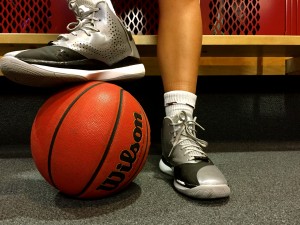Competition weaves a thread between all individuals who are associated with it: parents, coaches, referees, and competitors. The manner in which this thread is comprised influences what happens on the field in the heat of competition; interestingly enough, each individual that’s involved with a team, though s/he may never put on a uniform, holds a personal stake in the success or downfall of any team.
Throughout the course of this year, I followed three youth travel teams. This summer, I had the opportunity to focus my efforts mainly on observing the practices and games of a high school basketball girls travel team. Lauren Wiebe (Ford Scholar for Professor Chris Bjork) and I conducted ethnographic research at the team’s practices and competitions, taking note of everything that I heard and saw while at their events. I began to pick up on the patterns of interaction that existed between each individual of the organization, whether that was a parent, a coach, or a player. Slowly, I became part of their community and witnessed firsthand the culture of competition in youth travel sports. My ethnographic research culminated in gathering information on parents’ expectations of their children in athletics as well as their degree of involvement in these programs. Professor Bill Hoynes, my faculty mentor, and Professor Chris Bjork are handing out our surveys to more parents over the summer to gather more responses before we analyze our data in the fall.

Many parents see sports as a stepping stone to get into college, with the hopes of seeing their child receive an athletic scholarship.
One of the biggest attractions in becoming involved with competitive travel sports programs is the allure of gaining an athletic scholarship to cover the cost of receiving a college education. My individual research this summer was centered around determining the effects of travel sports on collegiate recruiting. I interviewed eight athletic administrators, college coaches, and club directors from around the country to begin collecting information for a chapter that focuses on collegiate recruiting in Professor Hoynes and Professor Bjork’s future book. Travel teams are viewed as the “necessary evil,” as they are essential for providing the visibility required in the recruiting identification process, but come with making large financial sacrifices. Future research will be conducted within this year to further explore issues of access within travel sports and how travel sports impact the student-athlete population at colleges throughout the United States.


